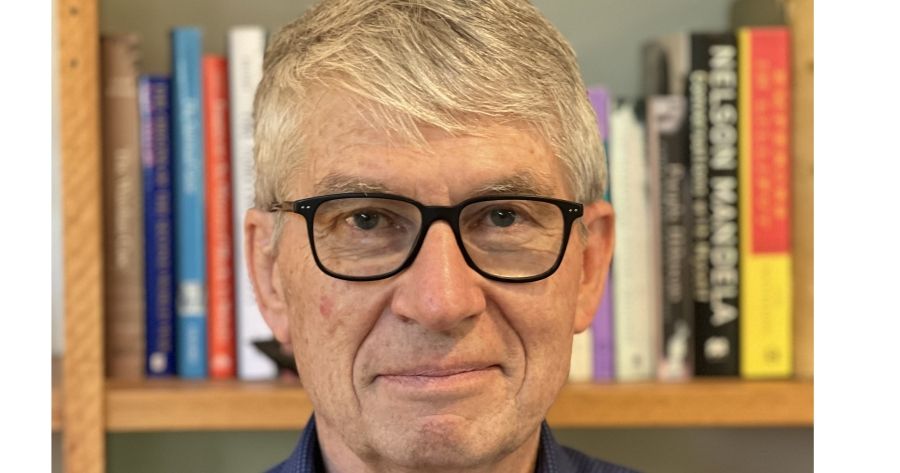
- Free Article: No
- Contents Category: Interview
- Custom Article Title: Open Page with Iain McCalman
- Review Article: No
- Article Title: Open Page with Iain McCalman
- Online Only: No
- Custom Highlight Text:
Iain McCalman was born in Nyasaland in 1947, and educated in Zimbabwe and Australia. He writes British, European, and Australian histories of popular science, politics, conservation, and literary cultures. His books include The Reef: A passionate history (2013) and Delia Akeley and the Monkey (2022). His new book is John Büsst: Bohemian artist and saviour of reef and rainforest (NewSouth, 2024). He is a former President of the Australian Academy of the Humanities and was Co-Founder and Co-Director of the Sydney [University] Environment Institute (2011-21). He was awarded Officer of the Order of Australia in 2007 for ‘services to history and the humanities’.
- Featured Image (400px * 250px):
-FEAT.png)
- Alt Tag (Featured Image): Open Page with Iain McCalman
What’s your idea of hell?
Trapped in prison forever with a rich bombastic male narcissist intent on persuading me to buy his version of the Bible.
What do you consider the most specious virtue?
Assertiveness, which is sometimes an excuse for bullying.
What’s your favourite film?
La Nuit de Varennes by Ettore Scola. Louis XVI and Marie Antoinette, attempting their failed flight from France, are followed by a coach containing radical Tom Paine, pornographer Restif de la Bretonne, and the queen’s hairdresser. Their coach, however, collides with that of the raddled old rake, Casanova. History has never been funnier or more poignant.
And your favourite book?
Anthony Powell’s twelve-volume A Dance to the Music of Time, which is loaded with dry wit, nostalgic melancholy, and crass characters whom we have all encountered.
Name the three people with whom you would most like to dine.
Three people from Africa: Nelson Mandela, who liberated South Africa; Nadine Gordimer, whose novel Guest of Honour is reminiscent of my father’s time as a District Commissioner in Nyasaland; and Alexandra Fuller, author of the hilarious Don’t Let’s Go to the Dogs Tonight.
Which word do you most dislike, and which would you like to see back in public usage?
I’d like to restore the word ‘momentarily’ with its original meaning of ‘for a very short time’ instead of its widely used new meaning of ‘very soon’; and I would love a return of Shakespeare’s insult ‘cream-faced loon’.
Do you have a favourite podcast?
I don’t listen to many podcasts but love the Travels Through Time series produced by British historian Peter Moore.
Who is your favourite author?
Robert Darnton, the brilliant American historian whose research and writing has revealed how a vast literary underworld of political pornography helped to create the French Revolution.
And your favourite literary hero or heroine?
Flora Poste, in the wonderful comedy Cold Comfort Farm by Stella Gibbons. Her sceptical barbs are delivered without fear or favour.
Which quality do you most admire in a writer?
Clarity, precision, and wit.
Which book influenced you most in your youth?
E.P. Thompson’s electrifying The Making of the English Working Class (1963) calls on historians to rescue the artisans and labouring poor from ‘the enormous condescension of posterity’. This gave me the inspiration to write a book asking that the same understanding be granted to a forgotten English Radical Underworld during the age of the French Revolution.
Name an early literary idol or influence whom you no longer admire or vice versa.
As a teenager, I thought Jane Austen wrote sentimental romances. I now realise that she possessed a rebarbative genius.
What, if anything, impedes your writing?
My sons say that only a bomb exploding in my office would stop me from scribbling.
What qualities do you look for in critics, and which ones do you enjoy reading?
I seek fairness and empathy, but also enjoy exposures of arrogant pontificators.
How do you find working with editors?
All my editors have helped to lift my ambitions and abilities, but the team of editor Ben Ball and copy-editor Meredith Rose most of all.
What do you think of writers’ festivals?
I prefer the smaller writers’ festivals that offer writer communities rather than encounters with literary celebrities.
Are artists valued in our society?
They seem to be valued mainly according to their monetary value, but artists are crucial to the foundations of our society.
What are you working on now?
I’m writing a memoir about growing up in, and revisiting, my original Malawian homeland.


-RAI.png)
Comments powered by CComment